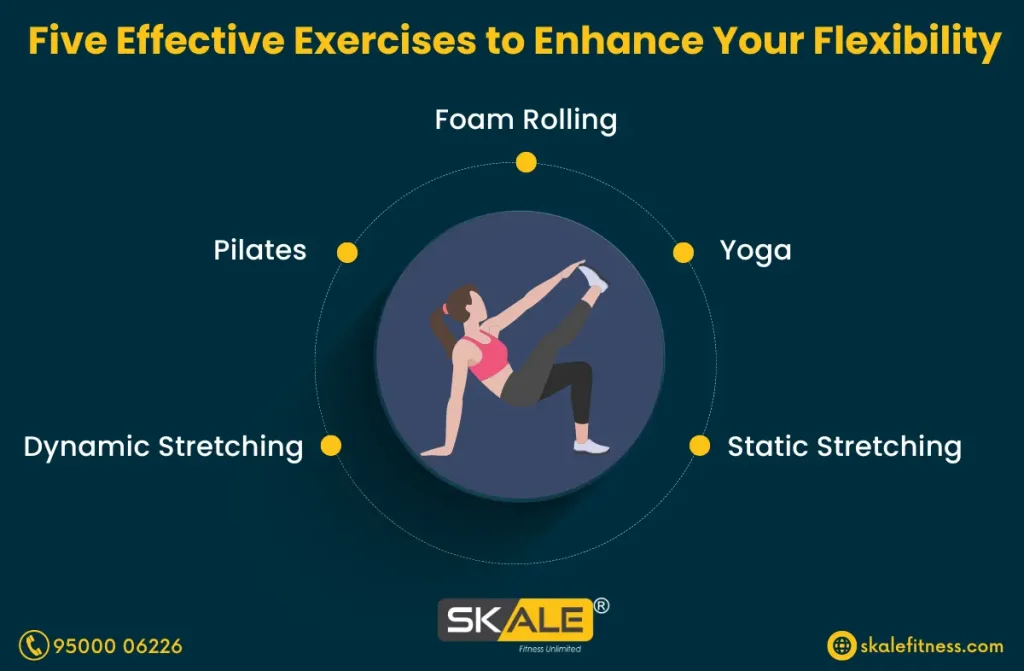When it comes to enhancing your overall fitness, the best exercise for flexibility can make a significant difference. Flexibility exercises not only improve your range of motion but also contribute to better posture, reduced risk of injury, and enhanced performance in various physical activities. This blog post explores the best exercises for flexibility and strength, discusses the benefits of these exercises, and provides a comprehensive guide to incorporating them into your routine.
The Importance of Flexibility
Flexibility is a crucial component of physical fitness. It allows your muscles and joints to move through their full range of motion, which is essential for performing everyday activities and engaging in physical exercise. The best exercise for flexibility helps to reduce muscle tension, improve circulation, and enhance overall body function.

Benefits of Flexibility Exercises
- Improved Range of Motion: Flexibility exercises help to lengthen muscles and tendons, allowing for greater movement.
- Reduced Risk of Injury: Flexible muscles and joints are less prone to strains and sprains.
- Better Posture: Flexibility exercises can correct muscle imbalances that lead to poor posture.
- Enhanced Athletic Performance: Athletes can perform better with a greater range of motion and reduced muscle stiffness.
Types of Flexibility Exercises
Incorporating a variety of flexibility exercises into your fitness routine ensures that you target all major muscle groups. Here are some of the best exercises for flexibility:
Static Stretching
Static stretching involves holding a stretch for a period of time, usually between 15 to 60 seconds. This type of stretching is effective for improving overall flexibility and is best performed after a workout when muscles are warm.
Examples of Static Stretches
- Hamstring Stretch: Sit on the floor with one leg extended and reach for your toes.
- Quadriceps Stretch: Stand on one leg and pull the opposite foot towards your buttocks.
- Shoulder Stretch: Pull one arm across your chest and hold with the opposite hand.
Dynamic Stretching
Dynamic stretching involves moving parts of your body through their full range of motion in a controlled manner. This type of stretching is ideal for warming up before exercise.
Examples of Dynamic Stretches
- Leg Swings: Swing one leg forward and backward, keeping your upper body stable.
- Arm Circles: Make large circles with your arms to warm up the shoulder muscles.
- Hip Circles: Rotate your hips in a circular motion to loosen up the hip joints.
Essential Stretching Exercises
Incorporating a variety of stretches into your routine ensures that you target all major muscle groups. Here are eight effective total body stretching exercises:
Quad Stretch
Target Area: Quadriceps
How to Perform:
- Stand and hold onto a wall or the back of a chair for balance if needed.
- Grab the top of your left foot and bend your knee, bringing the foot toward your glutes.
- Keep your knee pointing straight at the floor and squeeze your hips forward for a deeper stretch.
- Hold for 15 to 30 seconds and switch sides, repeating one to three times per leg.
Standing Hamstring Stretch
Target Area: Hamstrings
How to Perform:
- Take your left foot forward with your heel on the ground and tip from the hips, keeping your back flat.
- Lower down until you feel a stretch in the back of your leg.
- Rest your hands on your upper thighs to support your back.
- Hold for 15 to 30 seconds and switch sides, repeating one to three times.
Chest and Shoulder Stretch
Target Area: Chest and Shoulders
How to Perform:
- Sit or stand and clasp your hands behind your back, arms straight.
- Lift your hands toward the ceiling, going only as high as is comfortable.
- Hold for 15 to 30 seconds, repeating one to three times.
Upper Back Stretch
Target Area: Upper Back
How to Perform:
- Clasp your hands together in front of you and round your back, pressing your arms away from your body.
- Contract your abs to get the most out of this stretch.
- Hold for 15 to 30 seconds, repeating one to three times.
Biceps Stretch
Target Area: Biceps
How to Perform:
- Take your arms out to the sides, slightly behind you, with your thumbs up.
- Rotate your thumbs down and back until they are pointing to the back wall.
- Hold for 15 to 30 seconds, repeating one to three times.
Shoulder Stretch
Target Area: Shoulders
How to Perform:
- Take your right arm straight across your chest and curl the left hand above your elbow.
- Gently pull on the right arm to deepen the stretch in the shoulders.
- Hold for 15 to 30 seconds and switch sides, repeating one to three times on each side.
Seated Side Stretch
Target Area: Sides of the Body
How to Perform:
- Sitting or standing, clasp your hands straight up overhead, palms facing the ceiling.
- Stretch up and then over to the right, feeling a stretch down your left side.
- Hold for 15 to 30 seconds and switch sides, repeating one to three times.
Triceps Stretch
Target Area: Triceps
How to Perform:
- Bend your right elbow behind your head and use the left hand to gently pull the right elbow in further.
- Hold for 15 to 30 seconds and switch sides, repeating one to three times.

Best Exercise for Flexibility and Strength in Daily Life
Incorporating the best exercise for flexibility and strength into your daily routine can improve your overall quality of life. Here are some practical tips for making these exercises a part of your everyday activities:
Morning Stretch Routine
Start your day with a series of dynamic stretches to wake up your muscles and prepare your body for the day ahead.
- Sun Salutations: A sequence of yoga poses that stretch and strengthen the entire body.
- Cat-Cow Stretch: Loosen up the spine and improve core strength.
Office Exercises
Take short breaks throughout your workday to perform simple stretches and strength exercises that keep your body flexible and strong.
- Seated Spinal Twist: Stretch the back and improve spinal mobility.
- Desk Push-Ups: Build upper body strength without leaving your workspace.
Evening Relaxation
End your day with gentle stretching exercises to relax your muscles and promote a restful night’s sleep.
- Child’s Pose: Stretch the back and shoulders while promoting relaxation.
- Figure-Four Stretch: Release tension in the hips and glutes.
Best Exercise for Flexibility and Strength
Combining flexibility and strength exercises is key to achieving a balanced and effective fitness routine. Strength exercises not only build muscle but also enhance flexibility by promoting muscle elongation and joint stability.
Yoga
Yoga is one of the best exercises for flexibility and strength. It incorporates various poses and stretches that target different muscle groups, improving both flexibility and muscle tone.
Benefits of Yoga
- Increased Flexibility: Regular yoga practice lengthens muscles and improves joint mobility.
- Enhanced Strength: Many yoga poses require you to support your body weight, building muscle strength.
- Stress Reduction: Yoga promotes relaxation and reduces stress through controlled breathing and mindfulness.
Pilates
Pilates is another excellent exercise for flexibility and strength. It focuses on core strength, balance, and flexibility through controlled movements and stretches.
Benefits of Pilates
- Core Strength: Pilates exercises target the deep abdominal muscles, improving core stability.
- Improved Posture: Pilates promotes better alignment and posture by strengthening the muscles that support the spine.
- Flexibility: The controlled movements and stretches in Pilates enhance overall flexibility.
Preventing Falls with Flexibility Exercises
Flexibility exercises are not only beneficial for improving range of motion but also play a crucial role in preventing falls. As we age, maintaining flexibility becomes essential for balance and coordination.
Conclusion
Incorporating the best exercise for flexibility into your fitness routine can significantly enhance your overall physical health. Flexibility exercises, such as yoga and Pilates, improve range of motion, reduce the risk of injury, and contribute to better posture and balance. By combining flexibility and strength exercises, you can achieve a balanced and effective fitness routine that supports your long-term health and well-being. Remember, the best exercise for flexibility is the one that fits your lifestyle and fitness goals, so find what works best for you and stay consistent with your practice.




